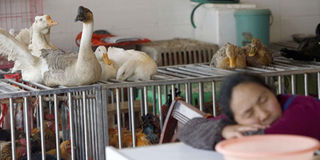No new H7N9 cases in China for a week

PHOTO | AFP This picture taken on April 16, 2013 shows a seller sleeping next to a cage in a poultry market in Guiyang, southwest China's Guizhou province as poultry industry got greatly affected by the H7N9 virus.
What you need to know:
- Experts fear the possibility of the virus mutating into a form easily transmissible between humans, with the potential to trigger a pandemic
BEIJING
No new human cases of the H7N9 virus have been recorded in China for a week, national health authorities said, for the first time since the outbreak began in March.
One previously infected patient died in the week beginning between May 13, the National Health and Family Planning Commission said in a statement late Monday, taking the total number of fatalities from the virus to 36.
But the number of confirmed cases was unchanged at 130. Of those, 72 have recovered and been discharged from hospital, it said, adding that no evidence of human-to-human transmission had been detected so far.
Experts fear the possibility of the virus mutating into a form easily transmissible between humans, with the potential to trigger a pandemic.
Flu viruses are often seasonal and much of China is experiencing warmer weather following the end of winter.
But the head of the World Health Organization (WHO) warned that the evolution of the outbreak was still unpredictable.
"Influenza viruses constantly reinvent themselves. No one can predict the future course of this outbreak," Margaret Chan said Monday at the World Health Assembly in Geneva.
"Although the source of human infection with the virus is not yet fully understood, the number of new cases dropped dramatically following the closing of live poultry markets," she added.
China was accused of covering up the outbreak of Severe Acute Respiratory Syndrome (SARS) that killed about 800 people around the world a decade ago, but Chan thanked authorities for their close collaboration with the WHO over H7N9.




